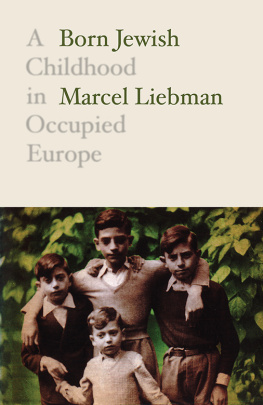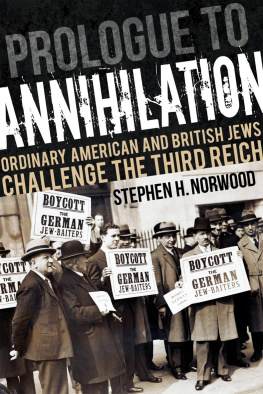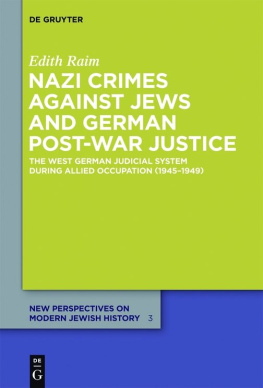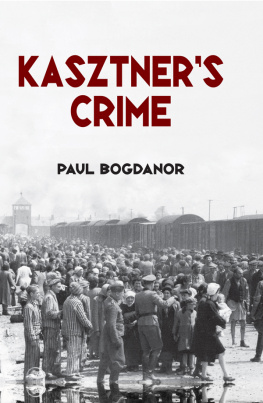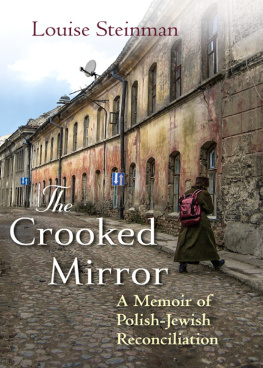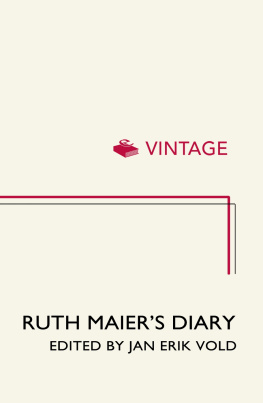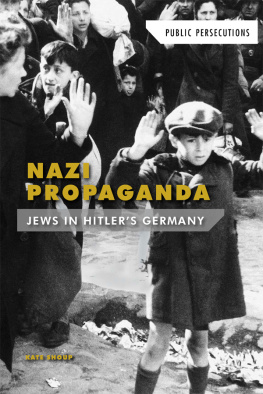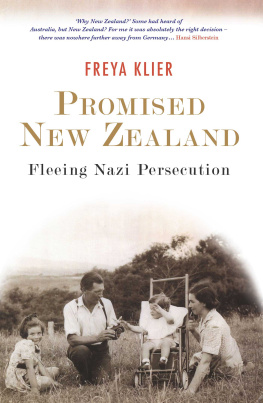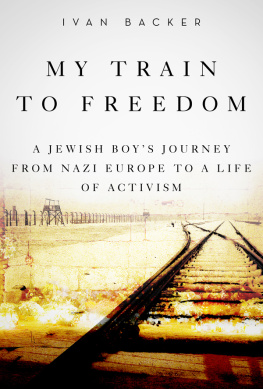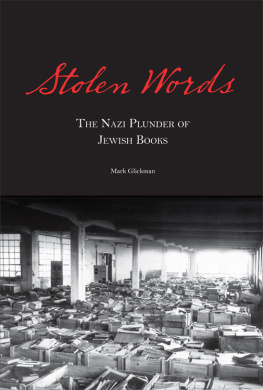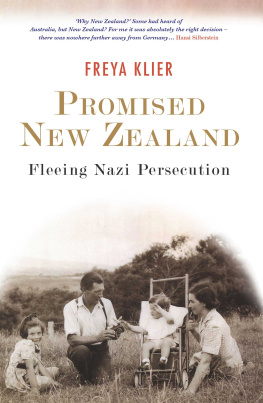Contents

BORN JEWISH
BORN JEWISH
A Childhood in Occupied Europe

MARCEL LIEBMAN
Translated by LIZ HERON
With an Introduction by
JACQUELINE ROSE

This paperback edition published by Verso 2020
English-language edition first published by Verso 2005
Originally published as N Juif
Editions Duculot, Paris 1997
Translation Liz Heron 2005, 2020
Introduction Jacqueline Rose 2005, 2020
All rights reserved
The moral rights of the author and translator have been asserted
1 3 5 7 9 10 8 6 4 2
Verso
UK: 6 Meard Street, London W1F 0EG
US: 20 Jay Street, Suite 1010, Brooklyn, NY 11201
versobooks.com
Verso is the imprint of New Left Books
ISBN-13: 978-1-78873-644-2
ISBN-13: 978-1-78663-573-0 (UK EBK)
ISBN-13: 978-1-78663-574-7 (US EBK)
British Library Cataloguing in Publication Data
A catalogue record for this book is available from the British Library
Library of Congress Cataloging-in-Publication Data
A catalog record for this book is available from the Library of Congress
Typeset in Fournier by Andrea Stimpson
Printed and bound by CPI Group (UK) Ltd, Croydon CR0 4YY
In memory of the victims.
In homage to the Jews and non-Jews whose common struggle snatched away so many of the Nazis desired prey.
To my children, so that they may feel compassion for the former and be inspired by the latter.
Contents
My thanks are due to Adeline Liebman for answering my queries and providing further insights into the experiences described in this book. Also to the Belgian centre for literary translators at Seneffe, for its generous hospitality.
TOWARDS THE END of his memoir, Marcel Liebman writes: Questioning corpses is an obsession I shall leave to those for whom it is a vocation. I have no faith in these false dialogues [] I myself will settle for questioning history. Liebman came relatively late to Born Jewish, this intensely personal account of his life as a child in Nazi-occupied Belgium, which was first published in French in 1977. By the time he wrote it, he had written acclaimed studies of Lenin and of the Russian Revolution; he would go on to write about Belgian socialism, a work incomplete when he died. Fiercely independent, he never joined any party. But this did not prevent him from leading a life of political engagement which included negotiating with Anwar Sadat in 1967 for the release of hundreds of Egyptian Jews imprisoned after Israels victory in the Six Day war. And he was an outspoken critic of Zionism. Liebmans life is haunted by the ghosts of his childhood notably that of his brother Henri who, at the painful crux of this memoir, was deported to Auschwitz at the age of fifteen. Miraculously, as this document repeatedly attests, Marcel and the rest of his family survived, but the war corrupted the peace and left its survivors stricken. The tribute he pays to his brother, here and in a sense in the whole corpus of his writing, takes the form of a steady refusal to sacralise his death, in favour of the task of the historian to question and to go on questioning history, so that its traumas never fossilise. History of this kind does not involve forgetting, but nor does it involve cultivating the memory of the harm. Zionism would make the fatal error of claiming to speak for the dead Jews of Europe, affirming Jewish identity as an absolute. For Liebman, the answer to racism is to denounce it, not to flee behind a defensive, self-isolating barrier of being and being only a Jew (hence the dedication here to Jews and non-Jews in their common struggle against Nazism). Amongst other things, this memoir stands as an extraordinary rejoinder to those who insist that Israel is the only, and definitive, answer to the genocide of the Jews.
One way of reading this memoir is as the story of the birth of political understanding. At the outbreak of the war, Liebman took from his father a fervent Belgian patriotism rendered complex, but somehow unmitigated, by the fact that they were a family of immigrant Jews (his father, born in Warsaw, had arrived in Antwerp as a young child, his mother, born in OwicimAuschwitz, had lived in Zurich before marrying in Brussels at the age of thirty). As children they had been taught to hate communism which we confused with a rejection of patriotism and a casting out of God. They abhorred Germany and fascism while being totally ignorant of its nature. As the net closed around them, no teacher at the school spoke of the war. When the announcement was made expelling all Jews, there was not a word of comment or protest. We were treated, writes Liebman, like frail, blind, befuddled children. Knowledge was dead knowledge, a blackening out of political thought. While the horrors of the war unfolded, there was a surfeit of talk about the great principles of morality as mass graves were being dug and filled. Liebmans indictment of bourgeois humanism could not be more severe and it extends beyond the war. When Marcel returns to the school in 1945 with his younger brother, only one teacher notices, let alone remarks on, the fact that Henri, the eldest of the three, is no longer there. At the time, writes Liebman, this cold passivity, or fatal resignation, which he now sees as aberrant, struck him as perfectly natural: the misfortunes of the war, including the most monstrous forms of racism, never did provoke my indignation at the time.
And yet, there are moments in this account when we can see the kernel of political consciousness. In one striking anecdote from the time of Belgiums capitulation to the Nazis, the roof of the house in which the family were temporarily sheltering collapses. Although several occupants are smothered or emerge to be torn to shreds by shrapnel, all the Liebmans survive. For his father, this is proof one he will appeal to for years to come that their family has been chosen by God. For Marcel, such a God who spares and destroys so indiscriminately, who saves his brother only to send him to Auschwitz can only be capricious. And what kind of God, as his father-in-law will later insist in quarrels with his father, would save one family while sacrificing another to such misfortune? There is something cruel in the idea of being chosen. Liebmans sense of social justice, and his critique of a too assured Jewish identity, are inseparable. The germs of his socialism and his mistrust of Zionism are simultaneously born.
Near the end of his memoir, Liebman imagines his reader asking him What does it mean to you now to be a Jew? For Liebman, there can be no simple or straightforward above all no absolute reply. But if Zionism is one reason for his caution, this narrative also offers another in the dreadful story it relates of the part played by the Jewish Councils, or Judenrat as they are more famously known, in the deportation of the Belgian Jews (their role was essential in making those deportations voluntary). Born Jewish could be fruitfully read alongside Hannah Arendts Eichmann in Jerusalem of 1963, whose account of the Jewish Councils complicity with the Nazi genocide has frequently been dismissed or disbelieved. Liebmans memoir fleshes out Arendts report with the lived substance of this complicity as it rebounds on the painful, if only partially grasped, experience of a young child. Although only five per cent of Belgian Jews had full citizenship, the committees were made up predominantly of Belgian Nationals. Status, class and, it turns out, ethnicity are all decisive. These privileged, bourgeois Jews of Belgium despised the recent Jewish immigrants from Poland whom they saw as another caste: Well, well!, one of them says to a poor Jewish woman with feeble command of the French language, If you ended up in Eastern Europe what would be wrong with that? [] Youd just be going back where you came from! In this, as Liebman points out, the Belgian Jews were in harmony with their German counterparts many of whom believed that Nazism would only be directed towards the lower orders and that they themselves would be spared. Among the most chilling parts of this memoir are the diary extracts of one S.V., a prominent member of the Council, who welcomes the instruction from Berlin to clamp down on the Jewish problem (It seems to be just a matter of mixed marriages. In one sense that would be quite fair), while lovingly detailing his trips to the opera and consumption of lobsters, as the Jews all around him were being deported or just struggling to survive: Let us try to be just as happy in the new peace. On the eve of liberation, as he senses the coming recriminations, he dismisses the Jews he betrayed as high and mighty [] foreigners who have to be put in their place, jealous ones whove had a bad time of it: Does it need to be spelled out that [they] are the Jewish survivors of the genocide? Liebman is unsparing. None of these leaders are ever brought to trial or publicly condemned. When S.V. dies years after the War, he is still one of the most prominent leaders of the Jewish community in Brussels. To the justification offered by one of their number that old wounds should not be opened, that the Jews had suffered enough Liebman simply asks: Which Jews?

